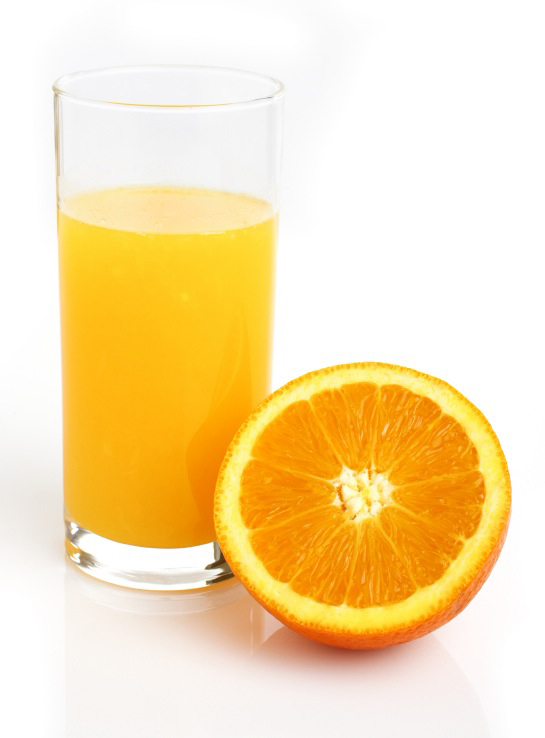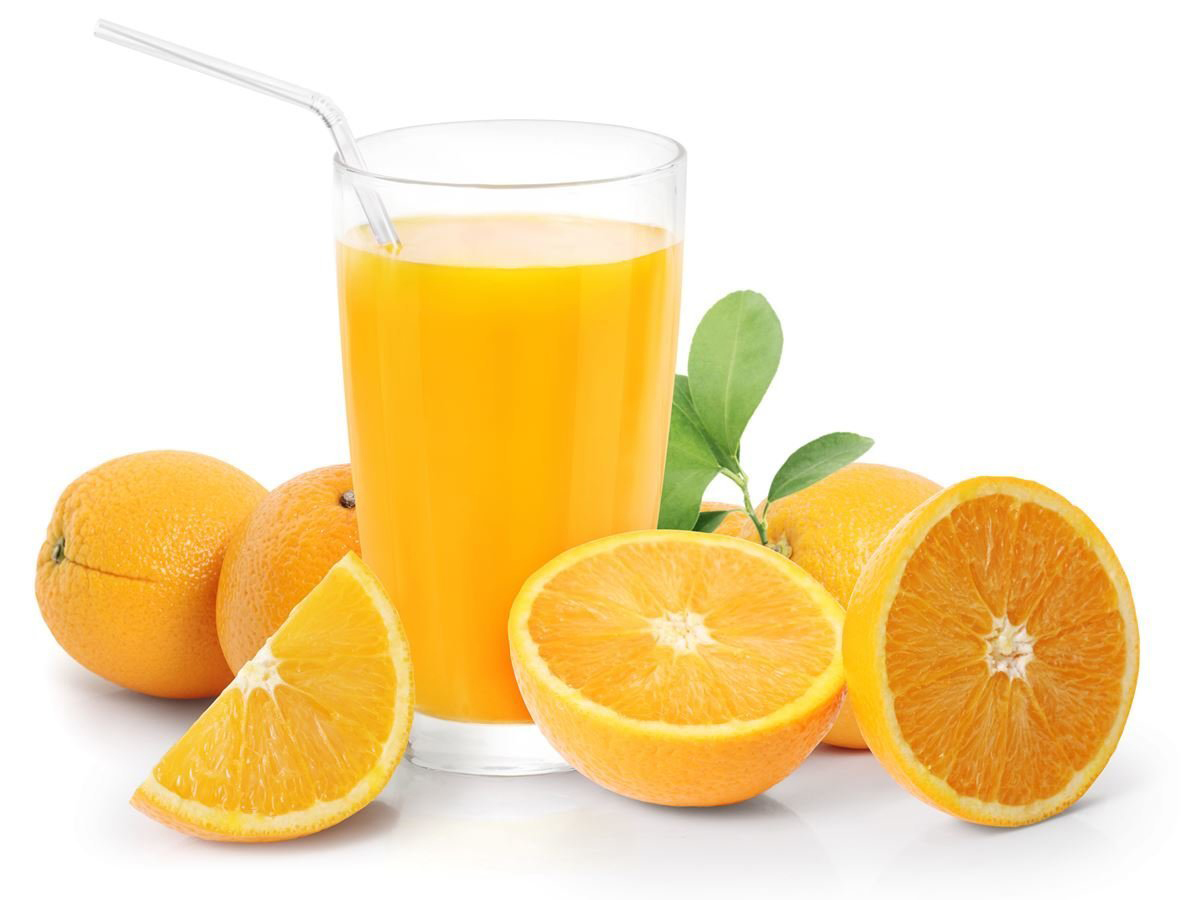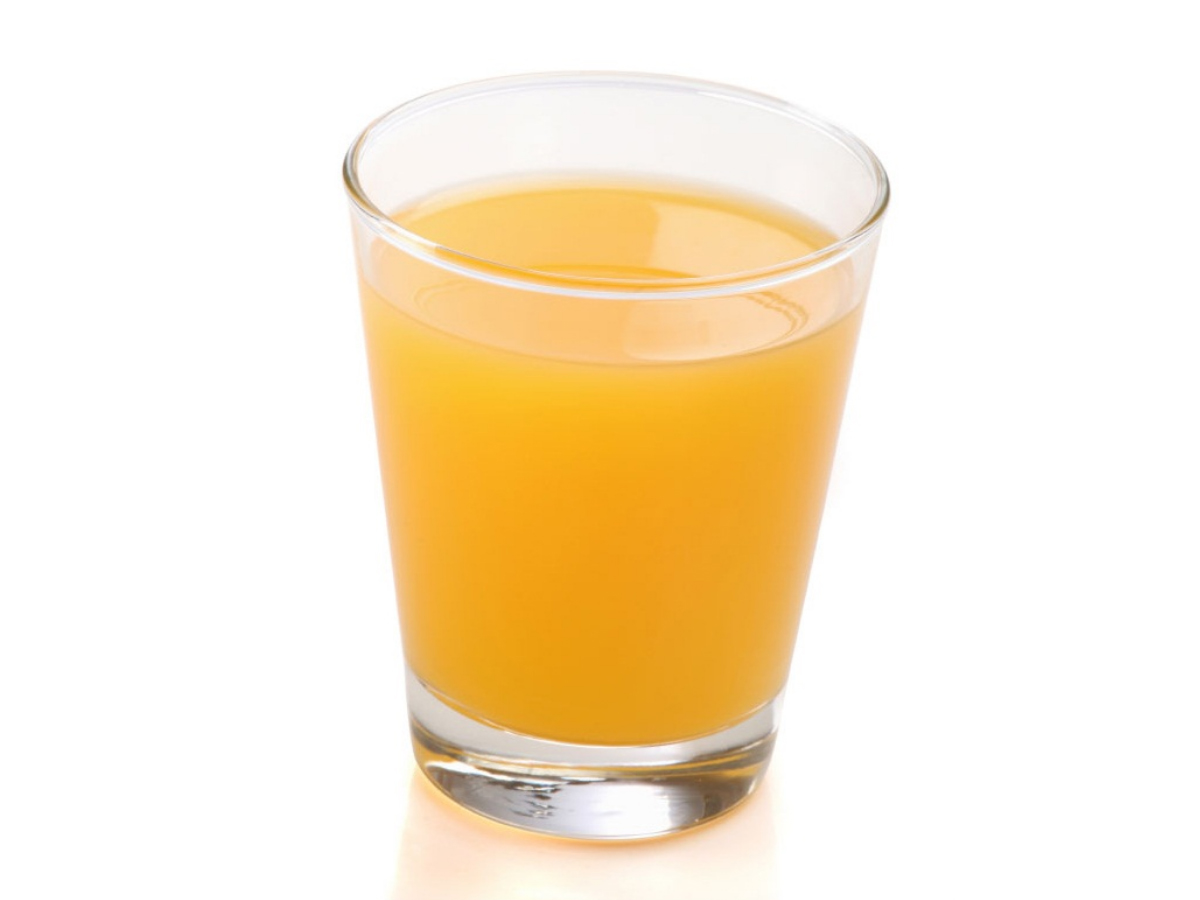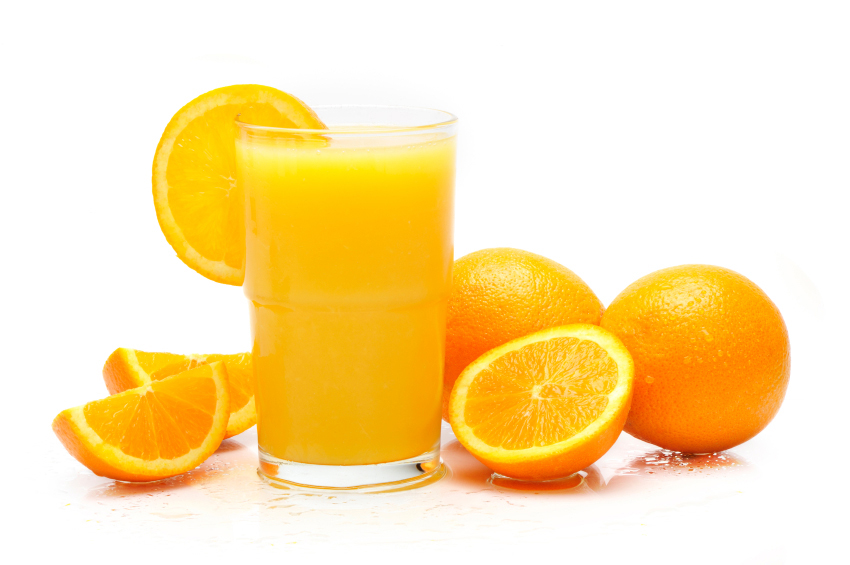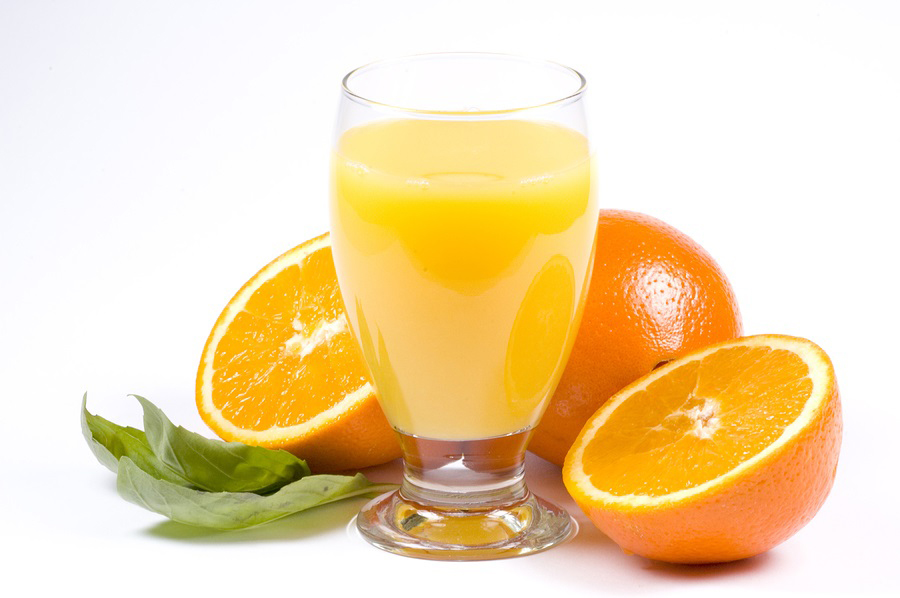| Orange juice Quick Facts |
| Name: |
Orange juice |
| Colors |
Orange |
| Calories |
112 Kcal./cup |
| Major nutrients |
Vitamin C (137.78%)
Carbohydrate (19.84%)
Vitamin B1 (18.58%)
Vitamin B9 (18.50%)
Copper (12.11%)
|
| Health benefits |
Strengthen immunity, Cancer prevention, Detoxification, Promotes blood circulation, Lowers inflammation |
A tropical to semitropical fruit, oranges, are found in an evergreen and small flowering tree which grows 5 to 8 meters tall. The tree bears seasonal fruits which are about 3 inches in diameter weighing about 100 to 150 grams. Oranges are classified into two categories: sweet and bitter. Navel, Valencia, Blood orange and Persian variety is traditional sweet varieties. The related varieties Tangerines are distinguished by loose and easily peeled skin with sweet juicy flesh. In Europe, it is known as mandarin oranges and Satsumas in Japan. Similar to oranges, it also belongs to Citrus Family Rutaceae and scientifically known as Citrus reticulata.
Orange juice is the liquid that is extracted from an orange fruit. The juice is produced by squeezing oranges. It could be found in several different varieties such as navel oranges, blood orange, tangerine, clementine and Valencia orange. Some varieties differ in amount of juice vesicles which is known as juicy bits in British English and pulp in American English. These vesicles possess juice of orange and could be left in or eliminated during manufacturing process. The vesicles juicy are depending on factors such as variety, species and season. The beverage name is abbreviated as “OJ” in American English.
The juice is extracted from mature oranges of Citrus sinensis species and hybrids thereof due to the importance of oranges to the state of Florida. It is regarded as an official beverage of Florida in 1967. This juice is offered to every visitor at state’s five Florida Welcome Centers. Commercially, orange juice is made by drying and rehydrating juice or concentrating juice and adding water to the concentrate later. It has long shelf life. Generally prior to drying, juice is pasteurized and oxygen is removed from it which demands the addition of flavor pack later made from orange products.
Orange juice offers numerous health benefits due to the high content of vitamin C and the simple sugar content is high in comparison to soft drinks.
History
Lemons loaded with vitamin C are rejected by American soldiers during World War II due to its unappetizing taste. However government explore for the food which require nutritional needs of soldiers with desirable taste and able to prevent diseases such as scurvy. The Florida department of Citrus, the federal government with group of scientists wanted to develop superior product to canned orange juice and resulted frozen concentrated orange juice. After the war ended, frozen concentrated orange juice was developed after three years.
The orange juice processing plants found in Florida by 1949 produced over 10 million gallons of concentrated orange juice. Consumers got attracted to the idea of concentrated canned orange juice being tasty, vitamin C packed product, convenient and also affordable. The preparation was so simple: thaw juice, add water and then stir. Thus by 1980s, food scientists formed fresh tasting juice called reconstituted ready to serve juice. Eventually, not from concentrate (NFC) orange juice was developed in 1990s and provided a new perspective orange juice by transforming product from can to freshness in carton.
Health Benefits of Orange Juice
Oranges offers abundant Vitamin C as well as fiber. Healthwise, it provides benefits to digestive system and promotes overall immunity to the body. Many people prefer to start their day with a glass of orange juice. Though this fruit is tropical or subtropical, it is found throughout the year. Research has shown that orange juice contains anti-inflammatory properties and high content of flavonoids. An orange juice contains impressive amounts of essential nutrients, minerals and vitamins required for healthy development and growth as well as overall well-being.
- Strengthen immunity
Orange juice is known as powerhouse of healing properties. It is also an excellent source of Vitamin C to be added to the diet. The single serving of Orange juice contains 200% of Vitamin C required for the body. Also called ascorbic acid, Vitamin C acts as a primary antioxidant in the body. It neutralizes and eradicates free radicals before it damages the body. The body requires Vitamin C for stimulation of other aspects of immune system. Moreover, ascorbic acid is a vital component of collagen essential for repairing cells and for growth of new tissues in the body.
- Cancer prevention
Being an antioxidant, Vitamin C also assists to prevent cancer. It prevents mutation of DNA cells to cancerous cells. Vitamin C as the first line of defense against cancer and other serious diseases. Besides Vitamin C, orange juice contains hesperidin which is an antioxidant that is related to lowering growth of tumors and stimulates apoptosis or programmed cell death in cancerous cells. Still the research is going on, it is positively associated to prevention of colon cancer. Likely, hesperidin is effective for various types of cancer.
- Detoxification
Orange juice has high content of Vitamin A which acts as antioxidant. Besides, it detoxifies body by promoting kidney functions. Vitamin A is associated to eye health and addition of Vitamin A to the diet prevents the chances of night blindness and macular degeneration. The serving size of orange juice grants 50% of regular recommended intake.
- Promotes blood circulation
Orange juice also contains folate which is a member of B complex such as vitamin B9. This vitamin is required for DNA formation and new cells growth. It prevents mutation of cells which is a free radical damage made to the body. Moreover, folate has vital role in building new red blood cells and stimulating flow of blood to extremities. It assures that the organs are working at full capacity and are well-oxygenated. It promotes overall metabolism of the body and makes the functions of systems efficient.
- Lowers inflammation
Citrus fruits are anti-inflammatory properties. Meals with high fat and high sugar results to inflammation of various body parts and result the development of increased insulin resistance. This is responsible for atherosclerosis and type 2 diabetes. Study shows that orange juice inhibits the chances of insulin resistance by lowering inflammation, protecting heart and overall cardiovascular protection.
- Reduce blood pressure
Orange juice contains hesperidin which is antioxidant and protects body against cancer and diseases. The water soluble plant compounds effects activity and function of small blood vessels. Research shows that this antioxidant lowers overall blood pressure and also chances of cardiovascular diseases.
- Cholesterol balance
High content of cholesterol is responsible for cardiovascular problems. Orange juice helps to lower effects and presence of bad cholesterol and increases good cholesterol in the body. It reduces the chances of heart attack, atherosclerosis and strokes.
- Helpful for smokers
Oranges has high content of beta-cryptoxanthin which is a carotenoid. Laboratory studies show that beta-cryptoxanthin lowers tumors caused due to exposure of chemical named NNK which is a carcinogenic byproduct of tobacco smoke. This also lowers inflammation of lungs and also shortness of bread caused by tobacco smoke. Researchers suggested that eating whole foods such as oranges, sweet peppers and oranges helps to lower the chances of lung tumors.
- Anemia prevention
People with vegetarian diet are prone to low intake of iron. In this case, orange juice could be helpful in preventing anemia to some extent. Vitamin C assist in absorption of iron from plant sources but this may not be sufficient for preventing anemia. One requires consuming lot of iron rich vegetables and also iron supplements if levels are too low.
- Formation of kidney stones
Research has shown that orange juice is helpful for maintaining kidney health. Orange juice has citric acid which binds calcium to the body and prevents formation of calcium phosphate or calcium oxalate stones which are two common types of kidney stones. It lowers level of uric acid that causes kidney stones.
https://www.youtube.com/watch?v=Gt0fXbb9JL8
How long is Orange juice good for?
The juice lasts for long time which depends on the how it is stored and the type of orange juiced. An orange juice freshly squeezed which has not been processed will be good for 3 to 4 days in refrigerator. Processed orange juice which is opened will be good for 5 to 7 days in fridge. An unopened orange juice will be good for two weeks.
Traditional uses
- This juice eliminates toxins from the body.
- It helps to maintain hydration.
- It is useful for stress and anxiety disorder.
- In Mexican traditional medicine, it is used for treating tuberculosis.
- Helpful in stomach upsets, promote appetite and prevent constipation.
- In Chinese medicine, this juice is used as a cooling agent for coughs, respiratory disorder and colds.
- It is also used to treat obesity.
- In France, orange juice is used for treating angina, diarrhea, hypertension, menstrual disorder, constipation and palpitation.
Precautions
- Too much consumption of Orange juice could be harmful.
- It is acidic and its excessive consumption can causes upset stomach due to the presence of too much acidic liquid in the body.
- Lot of orange juice causes massive fluctuation in blood sugar level and complicates the conditions for diabetic patients.
- Some people might experience intestinal problems and allergies.
- Drinking lot of orange juice causes migraines and skin outbreaks which depend on the tolerance of each person.
- Excessive presence of fiber causes diarrhea and abdominal cramps.
- It is acidic so might cause severe heartburns.
- Its excessive intake causes vomiting, nausea, insomnia, bloating and headaches.
How to Eat
- Make smoothies by blending orange juice, banana, avocado and teaspoon of raw chocolate.
- Mix orange juice with seasonings such as oregano, fish, basil, thyme and pepper.
- To make Asian style marinade, combine orange juice with ginger, soy sauce, cilantro, garlic and sesame oil.
- Substitute water with orange juice in cake or quick bread recipes.
- Orange juice could be added to salads.
- It is a healthy beverage.
- It is used as a base for marinades and fat free salad dressing.
- Add orange juice to baked goods, meringue pie and cakes.
- It is used in glazes and sauces.
- It is added to appetizers and desserts.
- Squeeze orange juice over fruit salad to prevent browning.
- Orange juice could be blended with Vanilla ice cream.
- It is also used in savory dishes.
Other Facts
In North America and Europe, orange juice is quite popular than fresh oranges.
References:
https://en.wikipedia.org/wiki/Orange_juice
http://www.thebestofrawfood.com/history-of-orange-juice.html
https://www.dabur.com/realfruitpower/fruit-juices/orange-juice
https://steptohealth.com/benefits-drinking-orange-juice-everyday/
https://www.doctorshealthpress.com/food-and-nutrition-articles/benefits-of-orange-juice/
https://www.belmarrahealth.com/10-health-benefits-of-drinking-orange-juice/
http://www.plantshospital.com/orange-juice/
http://www.irjponline.com/admin/php/uploads/1212_pdf.pdf
https://www.tarladalal.com/glossary-orange-juice-118i
https://www.lybrate.com/topic/benefits-of-orange-juice-and-its-side-effects
https://www.organicfacts.net/health-benefits/beverage/orange-juice.html
https://www.curejoy.com/content/health-benefits-of-orange-juice/
Comments
comments



